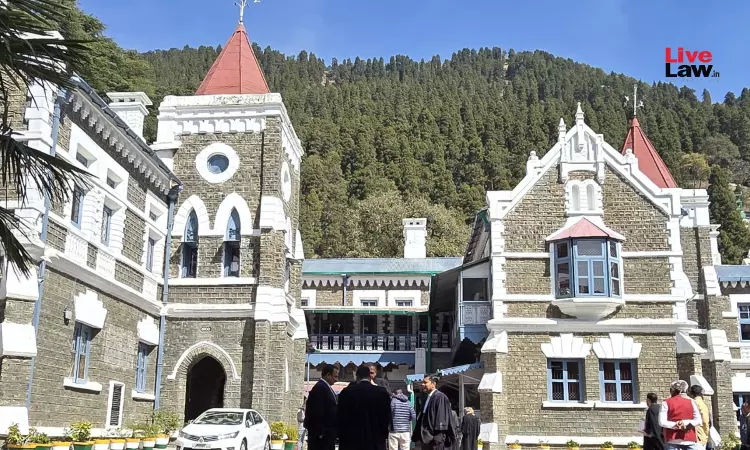- Home
- /
- High Courts
- /
- Uttarakhand High Court
- /
- Does S. 482 BNSS Override State's...
Does S. 482 BNSS Override State's Anticipatory Bail Restrictions U/S 438 CrPC? Uttarakhand High Court Refers Issue To Larger Bench
Sparsh Upadhyay
8 Aug 2025 7:32 AM IST
In a significant order, the Uttarakhand High Court recently referred to a larger Bench the question as to whether the provisions of Section 482 BNSS would prevail over the State amendment to Section 438 CrPC, which contains restrictions on grant of relief in serious offences, particularly in light of the more liberal approach adopted in the BNSS with respect to anticipatory bail. A...
In a significant order, the Uttarakhand High Court recently referred to a larger Bench the question as to whether the provisions of Section 482 BNSS would prevail over the State amendment to Section 438 CrPC, which contains restrictions on grant of relief in serious offences, particularly in light of the more liberal approach adopted in the BNSS with respect to anticipatory bail.
A bench of Justice Alok Kumar Verma framed the following issue while hearing a batch of anticipatory bail pleas filed u/s 482 BNSS by certain accused apprehending arrest in connection with cases registered both under the IPC, POCSO Act, NDPS Act, etc:
"Whether the provision of Section 482 of the Bharatiya Nagarik Suraksha Sanhita, 2023 would prevail over the Uttarakhand State Amendment under Section 438 of the Code of Criminal Procedure, 1973 and since the provisions of the Sanhita, 2023 are beneficial to the accused, can it be applied with respect to earlier cases (regardless of when the case of the accused originated)?"
Briefly put, in the bail pleas, the State's counsel raised a preliminary objection to the maintainability of these applications as it was contended that Section 438 CrPC, as of the Code as amended by the State of Uttarakhand, doesn't allow for anticipatory bails in the following cases:
- the Unlawful Activities (Prevention) Act, 1967;
- the Narcotic Drugs and Psychotropic Substances Act, 1985;
- the Official Secrets Act, 1923;
- the Uttarakhand (Uttar Pradesh Gangsters and AntiSocial Activities (Prevention) Act, 1986;) Adaptation and Modification Order, 2002
- sub-section(3) of Section 376 or Section 376AB or Section 376DA or Section 376DB IPC;
- chapter 6 of IPC viz, offences against the state (except Section 129);
- POCSO Act;
- in the offences, in which death sentence may be awarded.
The Court, however, noted that Section 531 of the BNSS repeals the CrPC but includes a savings clause allowing pending investigations and proceedings to continue under the old Code.
However, it also observed that the State of Uttarakhand had not amended Section 482 of the BNSS to reintroduce the earlier restrictions laid out in its version of Section 438 of the CrPC.
"Therefore, it seems clear that the State Government has taken a conscious decision to do away with the prohibition indicated in Section 438(6) of the Code of Criminal Procedure, 1973," it said.
In view of this, the single judge was of the prima facie opinion that the restrictions on granting anticipatory bail under Section 438(6) of the Code (as amended by the State of Uttarakhand) are no longer in effect.
However, noting that the Coordinate Bench had taken a contrary view in Mukesh Singh Bora vs State Of Uttarakhand, wherein anticipatory bail was held to be non-maintainable in a case involving Section 376(2)(n) and Section 9(m)/10 POCSO Act, the bench thought it appropriate to refer the matter to a larger bench.
Our readers may note that in a similar issue, the Allahabad High Court, in May this year, ruled that with the enactment of the BNSS, the Criminal Procedure Code (UP Amendment) Act, 2018, which imposed restrictions on the grant of anticipatory bail in the State (effective June 6, 2019) in cases under specific laws, including the UP Gangsters Act, stands 'impliedly repealed'.
Case title - Harish Kumar Prajapati vs. Central Bureau of Investigation, Anti Corruption Branch, Dehradun and connected matters



